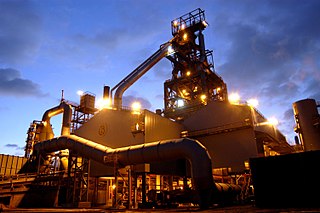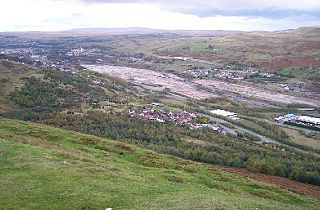
British Steel was a major British steel producer. It originated from the nationalised British Steel Corporation (BSC), formed in 1967, which was privatised as a public limited company, British Steel plc, in 1988. It was once a constituent of the FTSE 100 Index. The company merged with Koninklijke Hoogovens to form Corus Group in 1999.
Tata Steel Limited is an Indian multinational steel-making company, based in Jamshedpur, Jharkhand and headquartered in Mumbai, Maharashtra. It is a part of the Tata Group.

Tata Steel Europe Ltd. was a steelmaking company headquartered in London, England, with its main operations in the United Kingdom and the Netherlands. The company was created in 2007, when Tata Group took over the British-Dutch Corus Group.
Tinplate consists of sheets of steel coated with a thin layer of tin to impede rusting. Before the advent of cheap mild steel, the backing metal was wrought iron. While once more widely used, the primary use of tinplate now is the manufacture of tin cans.

Felindre is a rural village in southern Wales. Felindre is located in the far north of Swansea, in the electoral ward of Mawr.

Port Talbot Steelworks is an integrated steel production plant in Port Talbot, Wales, capable of producing nearly 5 million tonnes of steel slab per annum. This makes it the larger of the two major steel plants in the United Kingdom and one of the largest in Europe. Over 4,000 people work at the plant.
The United Steel Companies was a steelmaking, engineering, coal mining and coal by-product group based in South Yorkshire and Lincolnshire, England.
The Steel Company of Wales Ltd was a Welsh steel and tinplate producer. It was formed in 1947 and absorbed into British Steel Corporation in 1967, British Steel then merged with Hoogovens and became Corus UK Limited. The business now forms part of Tata Steel Europe.

The Ravenscraig steelworks, operated by Colvilles and from 1967 by British Steel Corporation, consisted of an integrated iron and steel works and a hot strip steel mill. They were located in Motherwell, North Lanarkshire, Scotland.
Aberpergwm is the site of a colliery in the Vale of Neath near Glynneath in south Wales.

Llanwern steelworks is located in Llanwern, east of the City of Newport, South Wales.
Richard Thomas was an English tin plate manufacturer. He was the founder of Richard Thomas & Co., which later merged with Baldwins Ltd to become Richard Thomas and Baldwins, which in turn was absorbed into British Steel Corporation in the 1960s.

Ebbw Vale Steelworks was an integrated steel mill located in Ebbw Vale, South Wales. Developed from 1790, by the late 1930s it had become the largest steel mill in Europe. It was nationalised after World War II. As the steel industry changed to bulk handling, iron and steel making was ceased in the 1970s, and the site was redeveloped as a specialised tinplate works. It was closed by Corus in 2002, but is being redeveloped in a joint partnership between Blaenau Gwent Council and the Welsh Government.

The Panteg Steel Works was situated in the village of Panteg, adjacent to Sebastopol, and Griffithstown, in the district of Torfaen, South Wales. The steel works was founded in 1873, and operated for over 130 years until its closure in 2004. A number of 'firsts' occurred at Panteg Steel Works during its long life, including the first full production of stainless steel in the UK outside Sheffield in 1944, the installation of the first production vertical caster in the UK in 1960 and the commissioning of British Steel's first Argon Oxygen Decarburizer in 1972. Planning permission was given to turn the works into residential housing in 2010, when the site became the Parc Panteg housing estate.

The Melingriffith Tin Plate Works were post medieval tin and iron works located on Tŷ-mawr Road, in Whitchurch, Cardiff, Wales. Founded sometime before 1750, it was the largest tin-plate works in the world by the end of the 18th century. Subsequent to the closure of tin plate works in 1957, the 200-year-old Melingriffith water pump was named a scheduled monument. It is one of the earliest and most important works of its kind, and may be "the most notable surviving monument of the tinplate industry".

The Iron and Steel Industry in Scunthorpe was established in the mid 19th century, following the discovery and exploitation of middle Lias ironstone east of Scunthorpe, Lincolnshire, England.

Trostre Steelworks is a tinplate manufacturing facility located in Pemberton, Carmarthenshire, just outside Llanelli, West Wales. Planned by the Steel Company of Wales in 1947, today it is part of Tata Steel Europe's infrastructure.

Gwent Archives is the local records office and genealogy centre, based in Ebbw Vale, South Wales for the historic county of Monmouthshire. It covers the modern local authority areas of Blaenau Gwent, Caerphilly County Borough, Monmouthshire, Newport and Torfaen.

RTB Ebbw Vale Football Club are a Welsh association football club based in the town of Ebbw Vale, Blaenau Gwent, South Wales. The team was founded in 1951 as the football club of the Richard Thomas and Baldwins Steelworks. They currently play in the Gwent County League Premier Division.

The Treforest tinplate works in Treforest, Wales, operated between the late 18th century and 1939. The six remaining buildings on the site were constructed in the mid 19th century during which time the iron and tinplate industries were dominated by South Wales. These buildings form the best surviving group of tinplate manufacturing buildings in the region and are Grade II* listed.












